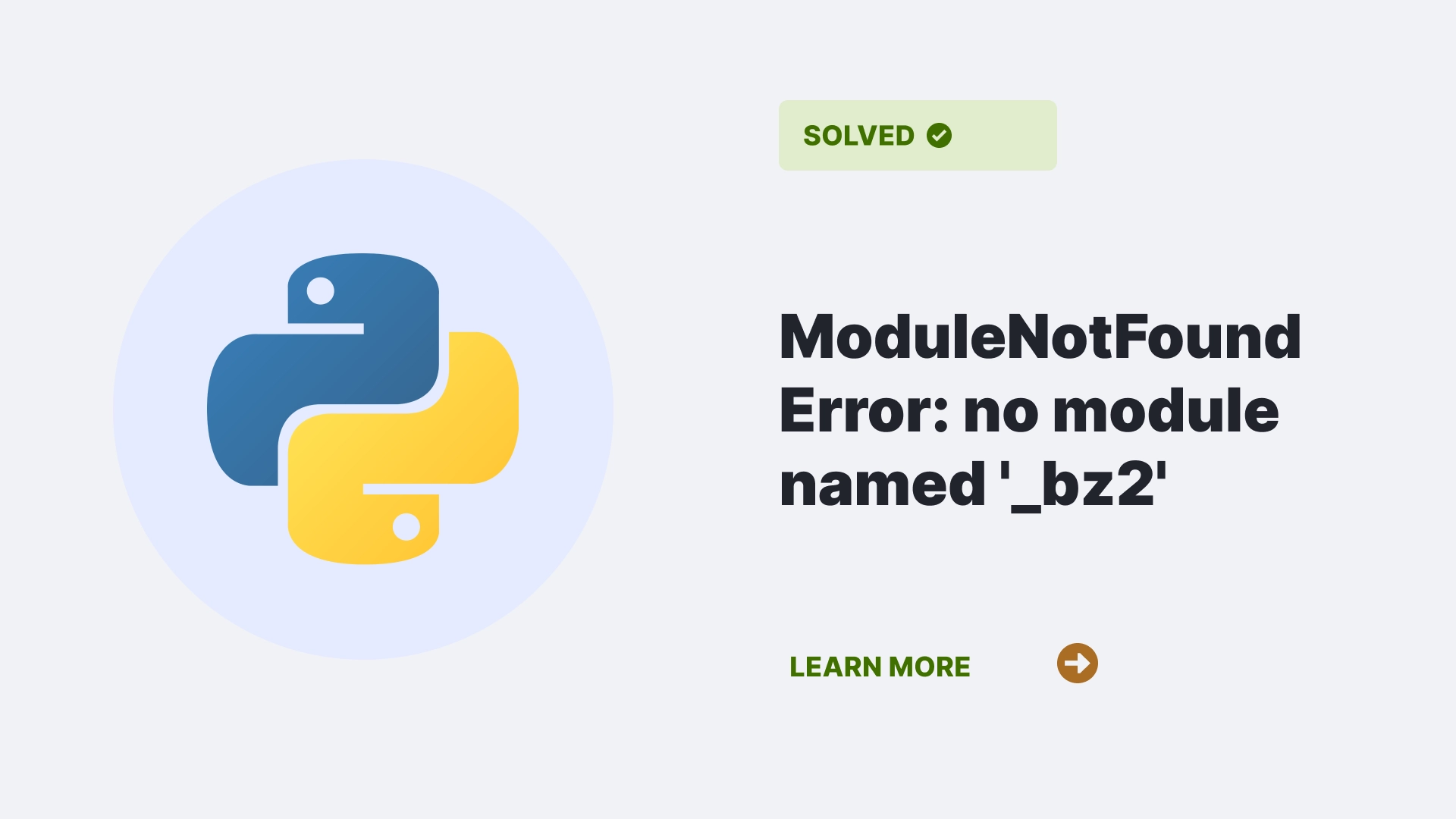In the vast world of programming languages Python is one such language used for various purposes, like web development, machine learning, data science, and many more. But like any other programming language, Python is not perfect, and sometimes you may encounter errors or problems when working with it. One such error is the ModuleNotFoundError: no module named ‘_bz2’, which indicates that the Python interpreter cannot find the _bz2 module, which is used for compression and decompression of data.
The _bz2 module is a built-in module that provides low-level access to the bz2 compression and decompression algorithms. The bz2 compression format is widely used for compressing large files or data streams, such as text, images, audio, etc. The ModuleNotFoundError: no module named ‘_bz2’ can be caused by one of the many reasons mentioned, such as incomplete or corrupted Python installation, missing or renamed _bz2 module, or dependency issues with certain Python packages.
The error can be resolved by reinstalling Python, installing the required dependencies, restoring the _bz2 module, or using a different compression format. This article will explore what this error means, what causes it, and how to resolve it along with FAQs of the ModuleNotFoundError: no module named ‘_bz2’ error in Python.
Contents
- 1 What is the ModuleNotFoundError: no module named ‘_bz2’?
- 2 What causes the ModuleNotFoundError: no module named ‘_bz2’?
- 3 How do you resolve the ModuleNotFoundError: no module named ‘_bz2’?
- 3.1 Reinstall Python from a reliable source
- 3.2 Install the required dependencies before building Python from the source.
- 3.3 Restore the original Python installation or use a different Python environment.
- 3.4 Restore the _bz2 module from a backup or a copy of the Python installation.
- 3.5 Use a different compression format instead of bz2
- 4 FAQs
- 5 Conclusion
- 6 Reference
What is the ModuleNotFoundError: no module named ‘_bz2’?
The ModuleNotFoundError: no module named ‘_bz2’ is a type of ImportError that occurs when the Python interpreter tries to import the _bz2 module and fails to locate it in the system. The _bz2 module is a built-in module that provides low-level access to the bz2 compression and decompression algorithms. The bz2 compression format is widely used for compressing large files or data streams, such as text, images, audio, etc.
The _bz2 module is usually imported by other Python modules that support compression and decompression of data, such as pandas, matplotlib, scipy, etc. For example, the following code snippet will import the _bz2 module indirectly by using the pandas module to read a CSV file compressed with bz2:
import pandas as pd
df = pd.read_csv('data.csv', compression='bz2')If the _bz2 module is unavailable in the Python environment, the import statement will raise the ModuleNotFoundError: no module named ‘_bz2’ error.
What causes the ModuleNotFoundError: no module named ‘_bz2’?
The ModuleNotFoundError: no module named ‘_bz2’ error usually occurs when the Python interpreter was built without the _bz2 module or when the _bz2 module is missing or corrupted. This can happen for various reasons, such as:
Incomplete or interrupted Python installation
If the Python installation was not complete or interrupted, some of the built-in modules, including the _bz2 module, may not be installed properly. This can result in an error when importing the _bz2 module or using any Python package that depends on it.
Missing dependencies for building Python from source
If Python was compiled from a source, some dependencies are required to build Python with the _bz2 module, such as the libbz2-dev package on Linux or the bzip2 library on Windows. If these dependencies are not installed before building Python, the _bz2 module will not be included in the Python installation. This can cause an error when importing the _bz2 module or using any Python package that depends on it.
Corrupted or modified Python installation
If Python was corrupted or modified by another program or user, some of the built-in modules, including the _bz2 module, may be damaged or deleted. This can result in an error when importing the _bz2 module or using any Python package that depends on it.
Deleted or renamed _bz2 module
If the _bz2 module was deleted or renamed by mistake or maliciously, the Python interpreter cannot find it in the system. This can result in an error when importing the _bz2 module or using any Python package that depends on it.
How do you resolve the ModuleNotFoundError: no module named ‘_bz2’?
The solution to the ModuleNotFoundError: no module named ‘_bz2’ error depends on the cause and the user’s operating system. Here are some possible ways to fix the error:
Reinstall Python from a reliable source
One of the simplest and most effective ways to resolve the error is to reinstall Python from a package manager or the official website, and ensure the installation is complete and successful. This will ensure that all the built-in modules, including the _bz2 module, are installed properly and available in the Python environment.
Install the required dependencies before building Python from the source.
If Python was compiled from the source, install the required dependencies before building Python, such as the libbz2-dev package on Linux or the bzip2 library on Windows. Alternatively, use a pre-compiled binary of Python that includes the _bz2 module.
Restore the original Python installation or use a different Python environment.
If Python was corrupted or modified by another program or user, restore the original installation or use a different Python environment, such as a virtual or container environment. This will ensure that the _bz2 module is not damaged or deleted and is available in the Python environment.
Restore the _bz2 module from a backup or a copy of the Python installation.
If the _bz2 module was deleted or renamed by mistake or maliciously, restore the module from a backup or a copy of the Python installation or reinstall Python. This will ensure that the _bz2 module is present and accessible.
Use a different compression format instead of bz2
Some Python packages that support compression and decompression of data, such as pandas, matplotlib, scipy, etc., allow you to specify the compression format as an argument. For example, to read a CSV file compressed with gzip instead of bz2, you can use:
import pandas as pd
df = pd.read_csv('data.csv', compression='gzip')Some common compression formats are gzip, zip, xz, lzma, etc.
FAQs
What is bz2?
Bz2 is a compression format that uses the Burrows-Wheeler algorithm and Huffman coding to compress and decompress data. It is widely used for compressing large files or data streams, such as text, images, audio, etc.
Can we install bz2 in Linux?

Yes, we can install bz2 in Linux by installing the libbz2-dev package, which provides the development files for the bzip2 library. The bzip2 library is required to build Python from source with the _bz2 module. To install the libbz2-dev package, we can use the following command:
Conclusion
The ModuleNotFoundError: no module named ‘_bz2’ error is a common error that Python users may encounter when the Python interpreter cannot find the _bz2 module, which is used for compression and decompression of data.
The ModuleNotFoundError: no module named ‘_bz2’ can be caused by various reasons, such as incomplete or corrupted Python installation, missing or renamed _bz2 module, or dependency issues with certain Python packages. The error can be resolved by reinstalling Python, installing the required dependencies, restoring the _bz2 module, or using a different compression format. We hope this article has helped you understand and fix the error.
Happy coding! 🐍
Reference
Follow us at PythonClear to learn more about solutions to general errors one may encounter while programming in Python.

